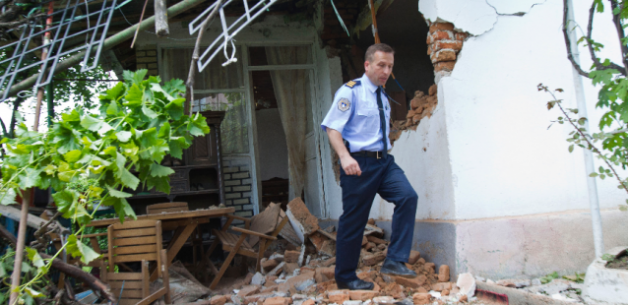A Kosovo police officer inspects the damage caused by an explosion that rocked Kosovo’s main power plant, in Obilic, Kosovo, Friday, June 6, 2014 Photo: AP Photo/Visar Kryeziu via Climate Progress
On Friday, Kosovo’s oldest lignite-based power plant exploded, killing two and injuring 13 people. The accident is the latest to occur in this country’s coal industry, which has claimed the lives of over 30 employees in different accidents in the last 15 years. Climate Progress reports on the event, and quotes Nezir Sinani, BIC’s Climate consultant:
Sinani, who now works as a climate change coordinator at the non-profit Bank Information Center, is now working to oppose the government of Kosovo’s latest proposal to build a new, 600 megawatt coal plant to replace the old one. As Kosovo stands on the world’s fifth largest reserve of lignite, the plant would continue to use it, and the government is asking the World Bank to help finance the $1.4 billion project.
Though the World Bank has not yet indicated whether it will support the new project, it does seem to be at odds with the institution’s recent pledge to focus on energy projects that promote clean air. The U.S., which is the largest shareholder of the World Bank, has also called for an end to U.S. government support for public financing of new coal plants overseas, unless the project is in a poor country where no economically feasible alternative exists….
“What’s most important to get across at this time is that I think this tragic accident should be a wake up call to the nation that producing energy from coal is an archaic and dangerous thing to do in the 21st century when we have abundant safe, and clean sources of energy,” he said. “It is the ultimate time that they rethink their strategy and start developing Kosovo’s renewable, clean and safe sources of energy.”
For the full article, see Climate Progress: Europe’s Dirtiest Coal Plant Explodes, Killing At Least 2

